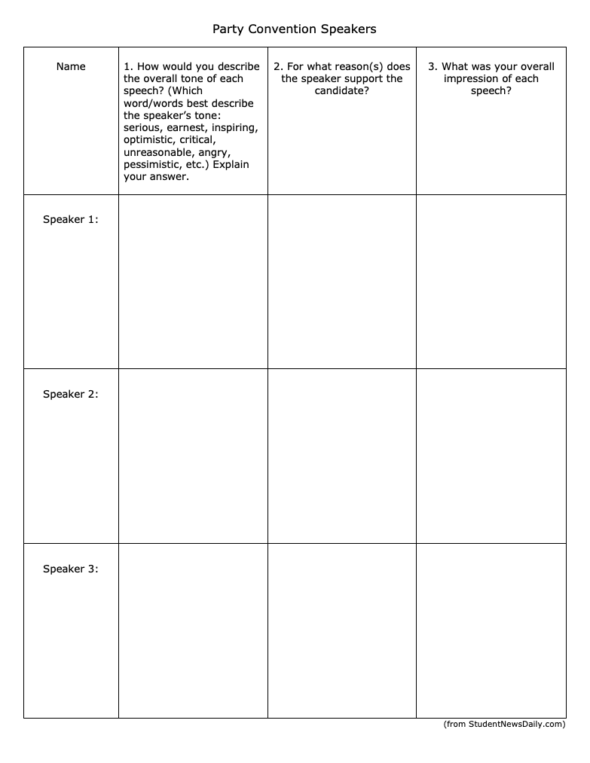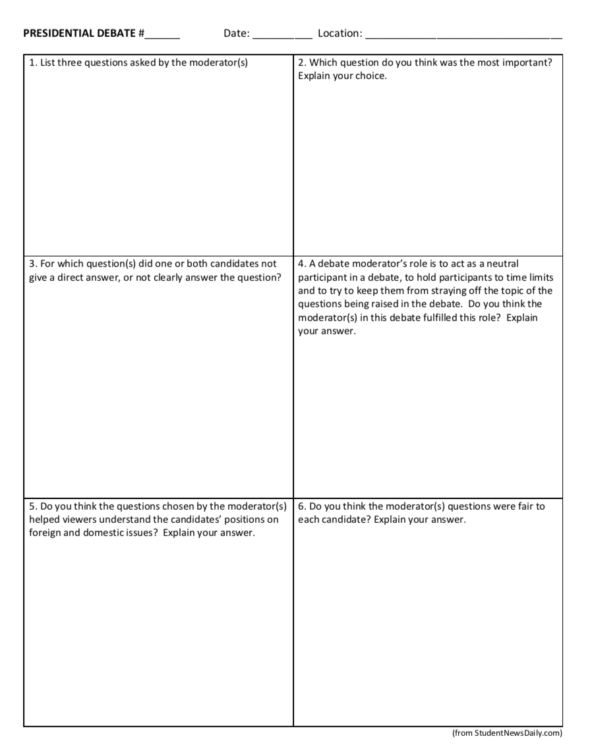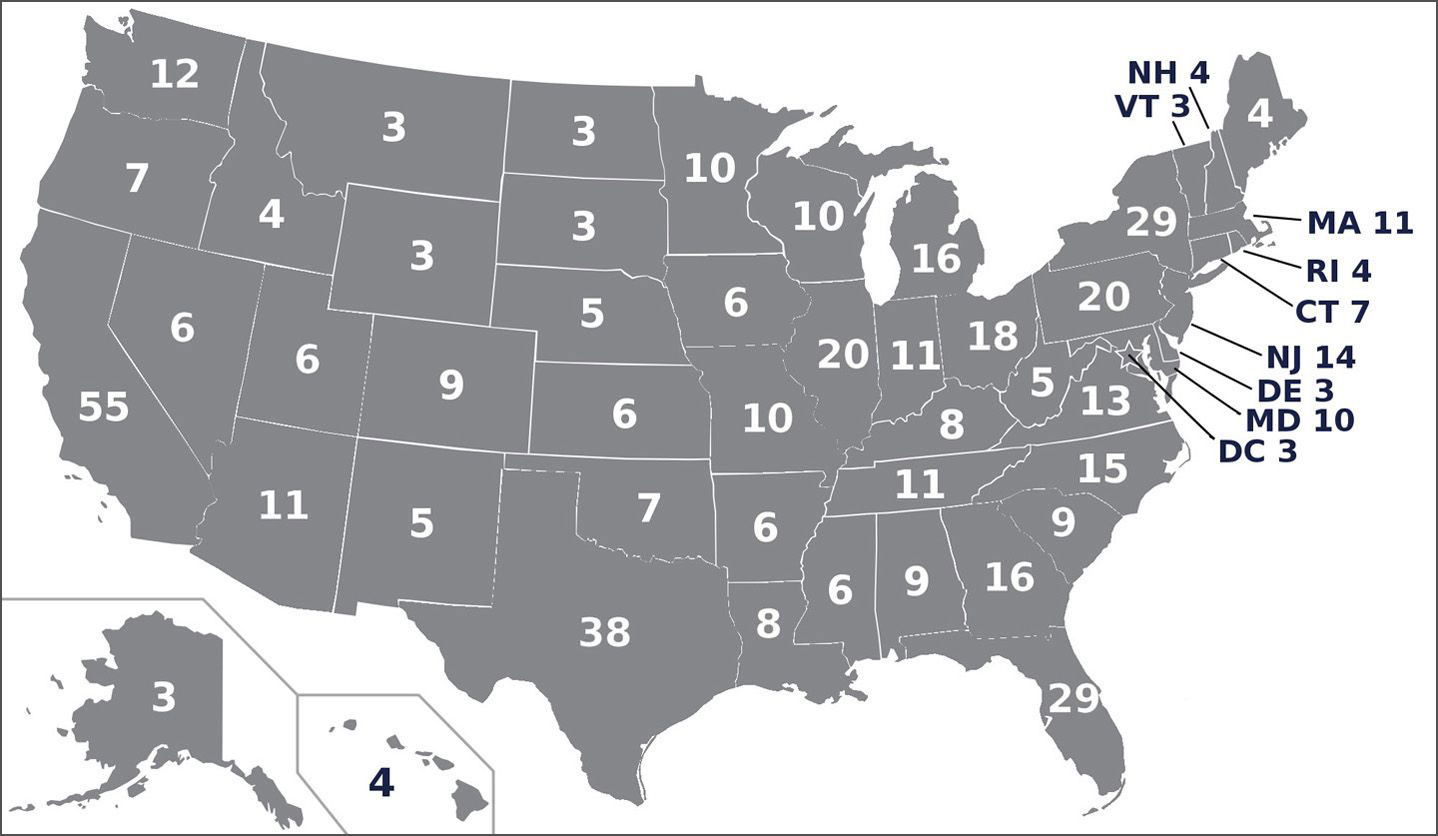Presidential Election 2024 Resources
“Democracy cannot succeed unless those who express their choice are prepared to choose wisely. The real safeguard of democracy, therefore, is education.” – Franklin D. Roosevelt
(For info on the 2024 General Election, visit Student News Daily’s General Election page.)
TABLE OF CONTENTS
(UPDATED 8/14/24)
- Party Conventions (includes student worksheet)
- Party Platforms (includes questions)
- The Presidential Candidates
- The Candidates on the Issues (includes student worksheets)
- Presidential Debates (includes student worksheet)
- The Electoral College (includes map, questions and video)
- Editorials
- Cartoon
PARTY CONVENTIONS (and Brokered Conventions):
- Watch some of the Republican National Convention speeches
- Watch some of the Democratic National Convention speeches
After the primary elections, party delegates officially choose the nominees at the national conventions, which were held from May to August 2024.
The Democratic National Convention will be held August 19–22, 2024 from Chicago, IL. View all videos at c-span.
The Republican National Convention was held July 15-18, 2024 in Milwaukee, WI. View videos of all speakers at C-Span.
The Libertarian Party Convention was held on May 23-27, 2024 in Washington, DC. View all videos at C-Span.
The Green Party’s 2024 Annual National Meeting took place online July 11–14, 2024. The Green Party will hold its presidential nominating convention virtually on August 15-24, 2024.
Questions (Party Conventions):
Watch videos from some of the RNC and DNC convention speakers, then answer the following questions:
List 3 speakers from each convention and answer the following questions for each speaker:
- Tone is the attitude a speaker takes towards a subject. How would you describe the overall tone of each speech? (Which word/words best describe the speaker’s tone: serious, earnest, inspiring, optimistic, critical, unreasonable, angry, pessimistic, etc.) Explain your answer.
- For what reason(s) does the speaker support the candidate?
- What was your overall impression of each speech?
OR, fill out the answers on the worksheet – View the pdf worksheet
PARTY PLATFORMS:
A National Platform is the official statement of a political party’s position on a wide variety of issues. Each issue included in the platform is a “plank.”
Party platforms and their planks are very important to the electoral process: They give the candidates a clear political position with which they can campaign. They give voters a sense of what the candidates believe in, the issues they think are important, and how – if elected – they will address them.
Both of the nation’s major political parties create platforms in advance of national elections so that voters have a clear view of the agenda the party will pursue if its members are elected to office. (A new Platform is adopted every four years by both the Democratic and Republican parties and is generally approved during the party’s national convention.)
- 2024 Republican Party Platform– 16 pages
- 2024 Democratic Party Platform – 80 pages (This is the draft released July 13, 2024)
- We the People Party. Robert F. Kennedy Jr. left the Democratic Party and is running as an Independent in his newly formed “We the People” party. Read about his proposed policies at kennedy24 policies page.
- 2024 Libertarian Party platform – 10 pages (As adopted by convention, May 2022)
- 2024 Green Party platform (Updated August/September 2022)
- 2024 Constitution Party Platform– 41 pages
View all current and previous party platforms at The American Presidency Project.
Questions (Party Platforms):
NOTE TO STUDENTS: Elections are important! This election will determine the type of country we will have going forward. Spend time and really get to know the policies each candidate will implement (president, Congress members and your state and local officials). Read what they say they will do. Read what they have done while in various offices. Understand who you are voting for and what type of policies they stand behind.
A preamble is an introductory statement that explains the document’s purpose and underlying philosophy. Read the Preamble to each party’s 2024 Platform.
(Democratic Preamble (from the July 13 draft), Republican Preamble)
Note: The 2024 Democrat Party Draft Platform is not linked to on Kamala Harris’ website. The news site Politico posted the draft of the platform, with the expectation that it will be passed at the Democratic Party Convention August 19-22. The Draft is what we have linked to here, and on which the questions are based.
Based on the Preamble:
1. a) Tone is the attitude a writer takes towards his subject. The tone can be serious, solemn, humorous, sarcastic, inspiring, optimistic, hopeful, enthusiastic, encouraging, cynical, critical… Read the opening paragraphs of each party’s Preamble. Which word(s) do you think best describes the tone of each introduction? Explain your answer.
Democrats –
Republicans-
2. For Kamala Harris:
a) List the accomplishments for which the Biden/Harris administration takes credit. (See para. 3-4 of Democrat Party Preamble)
b) List the policies Harris promises to implement, if elected. (See paragraphs 5, 7)
c) The Democrat Preamble promises Harris will “lower costs, lower energy costs and secure energy independence.” Donald Trump says Biden/Harris energy policies (such as closing the Keystone XL pipeline, denying government permits for oil and gas drilling, Kamala’s opposition to fracking) have driven the costs of energy and products up. Higher gas prices cause delivery charges and farm products costs to increase, causing sky-high inflation. The Biden/Harris administration blames supply chain issues from COVID and price gouging by greedy corporations for high costs. Trump points out that while president, his policies promoted use of oil and gas which lowered the cost of energy and the products we buy, and made the U.S. for the first time energy independent.
Since the Biden/Harris policies of the past four years have not resulted in “lower costs, lower energy costs and secure energy independence” – what will Harris do differently when elected to achieve these stated goals?
d) Ask a parent the same question.
3. For Donald Trump:
a) List the overall accomplishments from his first term for which Donald Trump takes credit. (See para. 5 of Republican Party Preamble)
b) Re-read paragraphs 7-13 about the issues Trump will tackle, if elected. Then read the 20 promises he says his administration “will accomplish very quickly when we win the White House and Republican majorities in the House and Senate.” – How many of these 20 promises do you think he will fulfill if he becomes president? Ask a parent the same question.
c) The Republican Preamble promises Trump will “Secure our elections, including same day voting, voter identification, paper ballots, and proof of citizenship.” Kamala Harris says Trump is “eroding our democracy with lies and threats, refusing to denounce violence, and making it harder to vote.” With whom do you agree: Trump’s proposed policies to make our election safer, or the Democrats assertion that he is “eroding our democracy…and making it harder to vote”? Explain your answer.
d) Regarding the border, Trump states in the Republican Preamble: “We must also vigilantly check those who enter our Country by other routes and ensure that no one can enter our Country who does not have the legal right to do so, and we must deport the millions of illegal migrants who [the Biden/Harris administration] has deliberately encouraged to invade our country. We will start by prioritizing the most dangerous criminals and working with local police. We must not allow [Biden/Harris’s] migrant invasion to alter our Country. It must not stand. Under the Trump Administration and a Republican Congress, it will be defeated immediately.” Do you support this policy? Ask a parent the same question and to explain his/her answer.
4. Read the accusations the Democrats make against Donald Trump in paragraphs 1, 5-6. What do you think:
a) Is Trump “a dictator” Kamala Harris needs to “stop from destroying our democracy”?
b) Is Trump’s vision “one focused not on opportunity and optimism, but on revenge and retribution”?
Explain your answers.
c) Ask a parent the same questions.
CHALLENGE QUESTIONS: The Democrat Party Platform (written by the DNC and Biden/Harris administration) is 80 pages. The Republican Party Platform (assumed to have been written by President Trump) – is 16 pages. Read each platform in its entirety.
1. How would you describe the main focus of each party – For each platform, what are 3 issues the party/candidate views as the most important facing our country today?
Democrats-
Republicans-
2. Compare 3 issues.
First issue – Energy:
Democrats – mandate the use of “clean energy” – energy that, when used, creates little or no greenhouse gas emissions such as wind and solar, mandating 50% of all new cars sold by 2030 must be electric, promoting solar powered homes, “lower gas prices at the pump, by standing up to Big Oil’s price gouging, releasing strategic petroleum reserves (which are held for national emergencies) to blunt profiteering” (page 28)
“Through record energy production of clean energy, oil, and gas, we’ve lowered prices at the pump for American families. The Administration also released nearly 200 million barrels of gasoline from the Strategic Petroleum and Northeast Gasoline Supply reserves; and it is lowering gas prices by up to 25 cents per gallon more in certain markets, particularly in the Midwest, by making cheaper, E15 ethanol-blended gasoline available each summer. And, the Administration is cracking down to prevent collusion by oil companies that could raise prices more.” (page 19) [Blames high prices on price gouging and corporate greed.]
Republicans – promote the use of America’s fossil fuels. “Under President Trump, the U.S. became the Number One producer of oil and natural gas in the world — and we will soon be again by lifting restrictions on American energy production and terminating the socialist Green New Deal. Republicans will unleash energy production from all sources, including nuclear, to immediately slash inflation and power American homes, cars, and factories with reliable, abundant, and affordable Energy.” (page. 7)
“Republicans will increase energy production across the board, streamline permitting, and end market-distorting restrictions on oil, natural gas, and coal. The Republican Party will once again make America energy independent, and then energy dominant, lowering energy prices even below the record lows achieved during President Trump’s first term.” (page 9)
Second and third issues – Find two more important issues from each platform and compare.
- What role does each party believe the government should take? (What type of government action and/or legislation, if any, does each party support? government mandates or deregulation?)
- For each issue, which party’s position lines up with your own? Ask a parent the same question.
THE PRESIDENTIAL CANDIDATES:
- Republican Donald Trump – campaign page and youtube page; Vice Presidential candidate JD Vance
- Democrat
Joe Biden – campaign page and youtube page;Note: President Biden announced by letter on July 20 that he was dropping out of the race and endorsed Vice President Kamala Harris to be his replacement. As of July 22, some top Democrats had endorsed VP Harris, and some hadn’t – most notably former President Barack Obama. (The Obamas endorsed Harris by phone on the evening of July 25). Kamala Harris – campaign page and youtube page. - Independent Robert F. Kennedy, Jr. – campaign page and youtube page; Vice Presidential candidate Nicole Shanahan
- Libertarian Chase Oliver – campaign page and youtube page. VP candidate Mike ter Maat
- Green Party presidential candidates
***NOTE TO STUDENTS***
To really understand the candidates’ proposals/plans for how they will address the issues important to Americans today, you need to listen to what they say, as well as the policies they have implemented, not what the news media and political analysts say about them. Take some time to watch at least one speech by each candidate on a specific issue such as the economy/inflation, border security, crime energy policies….
ABOUT THIRD PARTIES: The U.S. has a two-party system. Since the Civil War the two parties have been the Republican Party and the Democratic Party.
From time to time, third parties have gained traction with the electorate, most recently the Reform Party, led by Ross Perot, who won 19% of the popular vote in the 1992 presidential election. Third parties can sometimes push the major parties to consider their position on a specific issue (generally when they believe the party is not taking a strong enough stand, or is taking a moderate position on the issue). Few third-party candidates hold elected office at the state or national level. There are dozens of “third parties” in the U.S. including the Constitution Party (conservative), the Green Party (liberal) and the Libertarian Party (in general socially liberal, fiscally conservative). In 2024, we also have Robert F. Kennedy Jr’s “We the People” party.
NOTE:
- For the 2024 election, the Libertarian Party has secured ballot access in 38 states; the Green Party has qualified for the November ballot in 22 states, Constitution Party 21 states.
- As of August 14, Kennedy is on the ballot in 19 states. The list had included New York but, on August 12, Kennedy was blocked from appearing on the state’s ballot. He faces stiff resistance from Democratic political opponents attempting to block his November election bid with multiple lawsuits. (See ballotpedia for info.)
THE CANDIDATES ON THE ISSUES:
Some people vote for a candidate based on the person’s age, sex, race or religion. Some vote for a candidate because he/she is an interesting or dynamic speaker, is attractive, or looks like a leader.
Before you are eligible to vote, decide that you will vote for a candidate based on his/her positions on the issues, and who you think will enact policies that are best for the country–not just you personally. (e.g. many college students say they will vote for the candidate who ensures they will not have huge student loan debt – would that be enough of a reason to elect a person president? Ask a parent.)
View the “Presidential Candidates on the Issues” PDF worksheet and answer the following questions:
Questions – Candidates on the Issues:
- Three issues important to voters include:
–Inflation/the economy;
–Border crisis/illegal immigration (fentanyl flowing across southern border; criminals and terrorists infiltrating the U.S.)
–Reducing crime/violence/soft on crime DA’s – stores closing as a result of thefts not being prosecuted
Visit the campaign website for each candidate and find the positions/issues page. Complete the chart on the candidates and the issues: (view the PDF worksheet below) - What actions have each taken on each issue? (Trump as president (2016-2020) and Kamala Harris as Vice President under Biden (2020-2024), Senator from California (2017-2021), California Attorney General (2011-2017) and San Francisco District Attorney (2003-2010).
- Consider the candidates’ positions from the charts. Which candidate most lines up with your views?
- Ask a parent and a grandparent the same question.
PRESIDENTIAL DEBATES
The central focus of a debate should be to provide voters with information they need to measure the suitability of the candidates for office. The Commission on Presidential Debates was established in 1987 by the Democratic and Republican Parties and has sponsored all presidential and vice presidential general election debates since 1988.
→ On June 24, 2024, the CPD announced “the Biden-Harris Campaign informed the Commission that President Biden would not agree to debate under the sponsorship of the Commission during the 2024 general election campaign.” As of August 14, Kamala Harris has only agreed to one of 3 scheduled debates with Donald Trump. It can be assumed the Harris campaign also rejects the CPD as sponsor.
Should Trump supporters care that the Democrats have effectively eliminated the influence of the Commission on Presidential Debates?
- In 2020, the Trump campaign suggested moderators that included a number of Fox News hosts and conservative commentators. In response, the Commission said it would take “great care, as always, to ensure that the selected moderators are qualified and fair.” None of the campaign’s suggestions were invited to moderate.
- In 2020, Trump’s campaign also unsuccessfully lobbied for an additional debate, arguing there needed to be one earlier in September because the expansion of voting by mail means ballots could be decided earlier. The Commission rejected that idea, noting the “difference between ballots having been issued by a state and those ballots having been cast by voters, who are under no compulsion to return their ballots before the debates.”
Why aren’t third party candidates participating in the debates? — Third party candidates are not invited to participate in the 2024 presidential debates because they did not meet the requirements necessary to qualify: In 2000, the Commission on Presidential Debates (established in 1987 under the joint sponsorship of the Democratic and Republican parties) established a rule that for a candidate to be included in the national debates he or she must garner at least 15% support across five national polls. This rule has been controversial as it has effectively excluded U.S. parties other than the two major parties.
Presidential debate schedule:
- September 4, 2024, Fox News, Harrisburg, Pennsylvania.
- **September 10, 2024, ABC News. ABC’s David Muir, at Independence Hall in Philadelphia. *This is the only debate Kamala Harris has agreed to participate in. No word on why she will not agree to the other debates.
- September 25, 2024, NBC News. NBC’s Lester Holt in Grand Rapids, Michigan
Vice presidential debate:
- Not scheduled as of August 14.
Watch each debate. Pay attention to the questions the moderator asks. View the “Presidential Debate” PDF worksheet for the questions below.
Questions (Presidential Debates):
1. List three questions asked by the moderator.
2. Which question do you think was the most important? Explain your choice.
3. For which question(s) did one or both candidates not give a direct answer, or not clearly answer the question?
4. A debate moderator’s role is to act as a neutral participant in a debate, to hold participants to time limits and to try to keep them from straying off the topic of the questions being raised in the debate. Do you think the moderator in this debate fulfilled this role? Explain your answer.
5. Do you think the questions chosen by the moderator helped viewers understand the candidates’ positions on foreign and domestic issues? Explain your answer.
6. Do you think the moderator’s questions were fair to each candidate? Explain your answer.
THE ELECTORAL COLLEGE:
Electoral Votes: Each state has a certain number of electoral votes. The more people who live in your state, the more electoral votes your state gets. In 48 of the states, the candidate who gets the most votes gets all the electoral votes for that state. Nebraska and Maine do not follow the winner-take-all rule – there could be a split of electoral votes among candidates through a proportional allocation of votes. The first candidate to win 270 electoral votes becomes the President.
- The Electoral College was established by the U.S. Constitution (Article II, Section 1, Clause 2). It specifies how many electors each state is entitled to have and that each state’s legislature decides how its electors are to be chosen. U.S. territories are not represented in the Electoral College. From The Wall Street Journal: “This Electoral College was built into the U.S. Constitution because the country’s founders were skeptical about having elections determined by direct popular will and also wanted to ensure small states had a voice in national affairs.”
- The Electoral College is the institution that officially elects the President and Vice President of the United States every four years.
- The Electoral College consists of popularly elected representatives (electors) who formally elect the President and Vice President of the United States.
- The Electoral College is an example of an indirect election.
- The total number of U.S. electoral votes is 538, which is the sum of the nation’s 435 Representatives, 100 Senators, and 3 electors given to the District of Columbia. (i.e. Each state gets one elector per member of Congress.) e.g. Alaska gets three electoral votes, because there are two senators and one representative in Congress from that state. California gets 55 electoral votes, because there are two senators and 53 representatives in Congress from that state.
- A candidate needs 270 electoral votes to win the presidency – it’s half of 538, plus one.
- A candidate who wins the majority of votes in a state gets all its electoral votes. The exceptions to this rule are Nebraska and Maine, where the state winner gets the two electoral votes derived from the two senators, while the candidate who wins each congressional district gets the electoral vote derived from that representative.
- Technically, the election of the president of the United States takes place during a joint session of Congress on January 6th following Election Day. That’s when members of the House and Senate meet in the House chamber to preside over the counting of electors’ votes. The Twelfth Amendment mandates that the Congress assemble in joint session to count the electoral votes and declare the winners of the election. The session is ordinarily required to take place on January 6 in the calendar year immediately following the meetings of the presidential electors. Since the Twentieth Amendment, the newly elected House declares the winner of the election. In elections before 1936, the outgoing House counted the electoral votes. (from wikipedia)
How many Presidential candidates lost the popular vote but won the election by winning the electoral college vote?
- John Quincy Adams 1824 (elected by Congress) over Andrew Jackson
- Rutherford B Hayes 1876 (declared the Electoral College winner by an Electoral Commission) over Samuel J Tilden
- Benjamin Harrison 1888 over Grover Cleveland
- George W. Bush 2000 (After disputed Florida electors were awarded to him by Supreme Court Ruling) over Al Gore.
The final recount showed that Bush won. - Donald J. Trump 2016 over Hillary Clinton
NOTE: Samuel Tilden actually won more than half of the popular vote. The others only won a plurality [more votes than the other candidate, but not more than half the votes]. (from wikianswers)
SWING STATES:
A swing state, also referred to as a battleground state (or purple state because it is not majority Democratic “Blue State” or Republican “Red State”), is a state in which no single candidate or party has overwhelming support in securing that state’s electoral college votes. Such states are targets of both major political parties in presidential elections, since winning these states is the best opportunity for a party to gain electoral votes. Non-swing states are sometimes called safe states, because one candidate has strong enough support that he or she can safely assume that he or she will win the state’s votes. (from wikipedia)
- For more on the electoral college visit the U.S. National Archives and Records Administration.
- Visit the U.S. National Archives page “Frequently Asked Questions” regarding the Electoral College and electors.
- View a map of electoral college votes by state at: 270towin.com
- Take the “Electoral College Quiz” at: 270towin.com/quiz
Questions (The Electoral College):
1. How many electoral votes does your state have?
2. Why is your vote meaningful under the electoral college system?
Read a commentary by Walter Williams: The Electoral College Debate
EDITORIALS:
Editorials posted at Student News Daily:
- Facebook Employees Asked Zuckerberg If They Should Try to Stop Trump
- Don’t Vote if You Didn’t Do Your Homework
- How Tampering with Search Engines Could Swing an Election
CARTOON:
- See our 2017 election cartoon




